《课时过关8分钟》_八年级(上)_答案[1]
- 格式:doc
- 大小:139.00 KB
- 文档页数:13
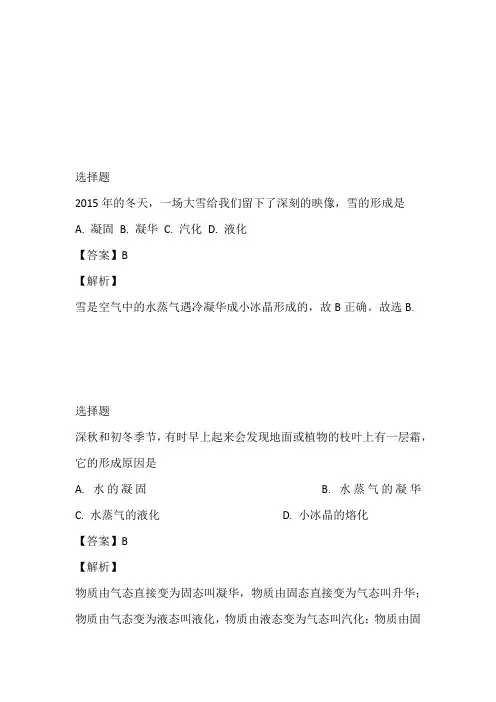
选择题2015年的冬天,一场大雪给我们留下了深刻的映像,雪的形成是A. 凝固B. 凝华C. 汽化D. 液化【答案】B【解析】雪是空气中的水蒸气遇冷凝华成小冰晶形成的,故B正确。
故选B.选择题深秋和初冬季节,有时早上起来会发现地面或植物的枝叶上有一层霜,它的形成原因是A. 水的凝固B. 水蒸气的凝华C. 水蒸气的液化D. 小冰晶的熔化【答案】B【解析】物质由气态直接变为固态叫凝华,物质由固态直接变为气态叫升华;物质由气态变为液态叫液化,物质由液态变为气态叫汽化;物质由固态变为液态叫熔化,物质由液态变为固态叫凝固。
霜是空气中的水蒸气遇冷凝华为固体的小冰晶。
故选B。
选择题下列现象中属于升华的是A. 烧水时,壶嘴喷出的“白气”B. 加在饮料中的冰块不见了C. 撒在地上的水一会儿没有了D. 放在衣柜里的樟脑丸越来越小【答案】D【解析】物体由固态变为气态的现象叫升华;物体由固态变为液态的现象叫熔化;物体由液态变为气态的现象叫汽化;物体由气态变为液态的现象叫液化。
A、烧水时,壶嘴喷出的“白气”,水蒸气液化形成的小水珠,故A错误;B、加在饮料中的冰块不见了,冰块发生了熔化现象,故B错误;C、撒在地上的水一会儿没有了,水发生了汽化现象,故C错误;D、放在衣柜里的樟脑丸越来越小,由固态直接变为气态,属于升华现象,故D正确。
故选D。
选择题“北国风光,千里冰封,万里雪飘”,形成这种自然景象的主要物态变化是A. 熔化和汽化B. 凝固和液化C. 凝固和凝华D. 汽化和升华【答案】C【解析】A. 熔化是物质由固态变为液态的过程。
汽化是物质由液态变为气态;冰的形成属于凝固;雪的形成属于凝华。
故A错误;B. 液化是物质由气态变为液态的过程;北方的冬天气温比较低,水结成冰,物质由液态变为固态属于凝固,而雪的形成属于凝华。
故B错误;C. 凝固时物质由液态变为固态的过程;冰的形成属于凝固;凝华是物质由气态直接变为固态的过程,雪花的形成是凝华过程。
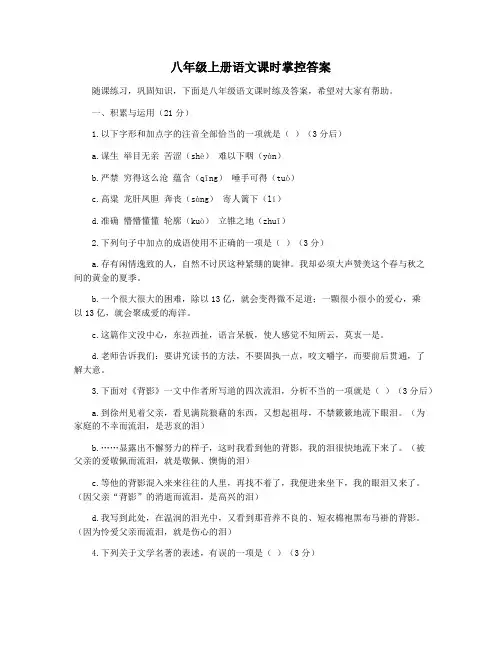
八年级上册语文课时掌控答案随课练习,巩固知识,下面是八年级语文课时练及答案,希望对大家有帮助。
一、积累与运用(21分)1.以下字形和加点字的注音全部恰当的一项就是()(3分后)a.谋生举目无亲苦涩(shè)难以下咽(yàn)b.严禁穷得这么沧蕴含(qīng)唾手可得(tuò)c.高粱龙肝凤胆奔丧(sàng)寄人篱下(lí)d.准确懵懵懂懂轮廓(kuò)立锥之地(zhuī)2.下列句子中加点的成语使用不正确的一项是()(3分)a.存有闲情逸致的人,自然不讨厌这种紧绷的旋律。
我却必须大声赞美这个春与秋之间的黄金的夏季。
b.一个很大很大的困难,除以13亿,就会变得微不足道;一颗很小很小的爱心,乘以13亿,就会聚成爱的海洋。
c.这篇作文没中心,东拉西扯,语言呆板,使人感觉不知所云,莫衷一是。
d.老师告诉我们:要讲究读书的方法,不要固执一点,咬文嚼字,而要前后贯通,了解大意。
3.下面对《背影》一文中作者所写道的四次流泪,分析不当的一项就是()(3分后)a.到徐州见着父亲,看见满院狼藉的东西,又想起祖母,不禁簌簌地流下眼泪。
(为家庭的不幸而流泪,是悲哀的泪)b.……显露出不懈努力的样子,这时我看到他的背影,我的泪很快地流下来了。
(被父亲的爱敬佩而流泪,就是敬佩、懊悔的泪)c.等他的背影混入来来往往的人里,再找不着了,我便进来坐下,我的眼泪又来了。
(因父亲“背影”的消逝而流泪,是高兴的泪)d.我写到此处,在温润的泪光中,又看到那营养不良的、短衣棉袍黑布马褂的背影。
(因为怜爱父亲而流泪,就是伤心的泪)4.下列关于文学名著的表述,有误的一项是()(3分)a.《西游记》中,唐僧先后在五行山交了孙悟空,鹰恨涧交了白龙马,高老庄交了猪八戒,流沙河交了沙和尚。
师徒历尽磨难,获得真经。
b.衍太太是一个善良、朴实、疼爱孩子、精通礼节的人,鲁迅在《父亲的病》《琐记》《狗猫鼠》中表达了对她的怀念之情。
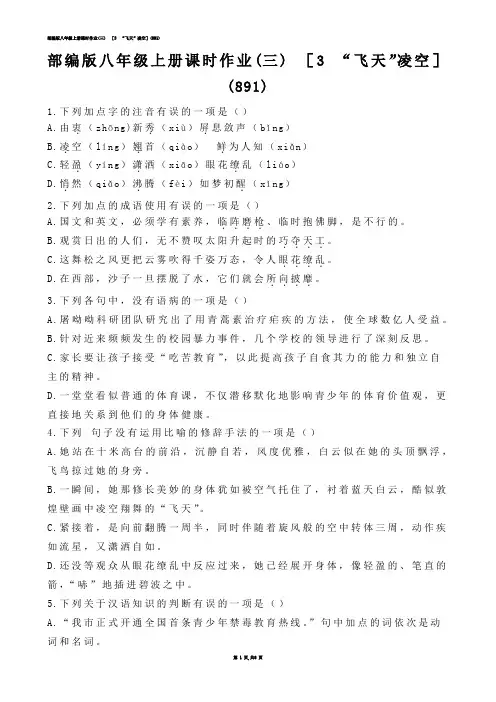
部编版八年级上册课时作业(三) [3 “飞天”凌空](891)1.下列加点字的注音有误的一项是()A.由衷.(zhōng)新秀.(xiù)屏.息敛声(bǐng)B.凌.空(líng)翘.首(qiào)鲜.为人知(xiǎn)C.轻盈.(yíng)潇.洒(xiāo)眼花缭.乱(liáo)D.悄.然(qiǎo)沸.腾(fèi)如梦初醒.(xǐng)2.下列加点的成语使用有误的一项是()A.国文和英文,必须学有素养,临阵磨枪....、临时抱佛脚,是不行的。
B.观赏日出的人们,无不赞叹太阳升起时的巧夺天工....。
C.这舞松之风更把云雾吹得千姿万态,令人眼花缭乱....。
D.在西部,沙子一旦摆脱了水,它们就会所向披靡....。
3.下列各句中,没有语病的一项是()A.屠呦呦科研团队研究出了用青蒿素治疗疟疾的方法,使全球数亿人受益。
B.针对近来频频发生的校园暴力事件,几个学校的领导进行了深刻反思。
C.家长要让孩子接受“吃苦教育”,以此提高孩子自食其力的能力和独立自主的精神。
D.一堂堂看似普通的体育课,不仅潜移默化地影响青少年的体育价值观,更直接地关系到他们的身体健康。
4.下列句子没有运用比喻的修辞手法的一项是()A.她站在十米高台的前沿,沉静自若,风度优雅,白云似在她的头顶飘浮,飞鸟掠过她的身旁。
B.一瞬间,她那修长美妙的身体犹如被空气托住了,衬着蓝天白云,酷似敦煌壁画中凌空翔舞的“飞天”。
C.紧接着,是向前翻腾一周半,同时伴随着旋风般的空中转体三周,动作疾如流星,又潇洒自如。
D.还没等观众从眼花缭乱中反应过来,她已经展开身体,像轻盈的、笔直的箭,“哧”地插进碧波之中。
5.下列关于汉语知识的判断有误的一项是()A.“我市正式开通全国首条青少年禁毒教育热线。
”句中加点的词依次是动词和名词。
B.“女排夺冠”“丝绸之路”“登顶珠穆朗玛峰”依次是主谓短语、偏正短语、动宾短语。
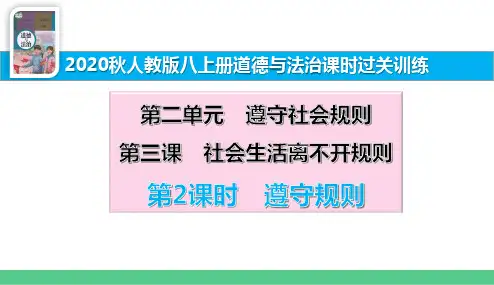
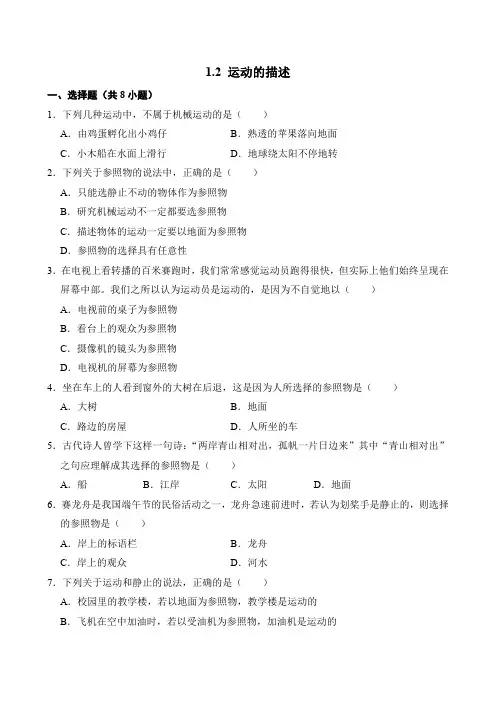
1.2 运动的描述一、选择题(共8小题)1.下列几种运动中,不属于机械运动的是( )A.由鸡蛋孵化出小鸡仔B.熟透的苹果落向地面C.小木船在水面上滑行D.地球绕太阳不停地转2.下列关于参照物的说法中,正确的是( )A.只能选静止不动的物体作为参照物B.研究机械运动不一定都要选参照物C.描述物体的运动一定要以地面为参照物D.参照物的选择具有任意性3.在电视上看转播的百米赛跑时,我们常常感觉运动员跑得很快,但实际上他们始终呈现在屏幕中部。
我们之所以认为运动员是运动的,是因为不自觉地以( )A.电视前的桌子为参照物B.看台上的观众为参照物C.摄像机的镜头为参照物D.电视机的屏幕为参照物4.坐在车上的人看到窗外的大树在后退,这是因为人所选择的参照物是( )A.大树B.地面C.路边的房屋D.人所坐的车5.古代诗人曾学下这样一句诗:“两岸青山相对出,孤帆一片日边来”其中“青山相对出”之句应理解成其选择的参照物是( )A.船B.江岸C.太阳D.地面6.赛龙舟是我国端午节的民俗活动之一,龙舟急速前进时,若认为划桨手是静止的,则选择的参照物是( )A.岸上的标语栏B.龙舟C.岸上的观众D.河水7.下列关于运动和静止的说法,正确的是( )A.校园里的教学楼,若以地面为参照物,教学楼是运动的B.飞机在空中加油时,若以受油机为参照物,加油机是运动的C.运稻谷的车辆和联合收割机以同样快慢、向同一方向前进,以地面为参照物,它们都在运动D.以地面为参照物,站在正在运行的自动扶梯上的乘客是静止的8.如图所示,2023年10月26日11时14分,搭载神舟十七号载人飞船的长征二号F遥十七运载火箭在酒泉卫星发射中心成功发射。
在火箭上升过程中,下列说法正确的是( )A.以地面为参照物,发射塔是运动的B.以火箭为参照物,发射塔是静止的C.以火箭为参照物,神舟十七号载人飞船是运动的D.以飞船内的航天员为参照物,发射塔是运动的二、填空题(共11小题)9.如图所示,人在打喷嚏、咳嗽时会喷出大量的飞沫,飞沫一般是直径大于5微米的含水颗粒,它里面包裹分泌物或病原菌,飞沫可漂浮在空气中。
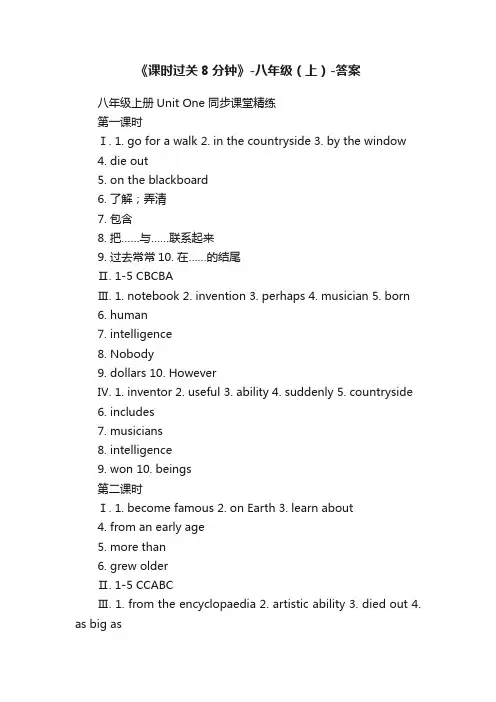
《课时过关8分钟》-八年级(上)-答案八年级上册Unit One 同步课堂精练第一课时Ⅰ. 1. go for a walk 2. in the countryside 3. by the window4. die out5. on the blackboard6. 了解;弄清7. 包含8. 把……与……联系起来9. 过去常常10. 在……的结尾Ⅱ. 1-5 CBCBAⅢ. 1. notebook 2. invention 3. perhaps 4. musician 5. born6. human7. intelligence8. Nobody9. dollars 10. HoweverⅣ. 1. inventor 2. useful 3. ability 4. suddenly 5. countryside6. includes7. musicians8. intelligence9. won 10. beings第二课时Ⅰ. 1. become famous 2. on Earth 3. learn about4. from an early age5. more than6. grew olderⅡ. 1-5 CCABCⅢ. 1. from the encyclopaedia 2. artistic ability 3. died out 4. as big as5. grows everywhere6. find out7. more than8. Some students; some9. learn about 10. in the countryside第三课时Ⅰ. 1. some 2. any 3. some 4. any 5. any; no; some6. anything7. Somebody8. anyone; no one9. something; nothing10. NothingⅡ. 1-5 BCACBⅢ. 1. dinosaur fossils 2. a scientist 3. great intelligence 4. his new inventions5. from an early age6. in the countryside7. die out8. find out9. go for a walk 10. born in第四课时Ⅰ. 1-5 AACAC 6-10 CACCBⅡ. 1. any 2. some; any 3. some 4. any 5. some; any; some 6. any 7. any 8. some 9. some 10. any; anyⅢ. 1. perhaps the most famous2. more than 3. became famous4. be better at5. dying out6. in the countrysideⅣ. 1-5 BDCAB第五课时Ⅰ. 1-4 AABC 5-8 BCACⅡ. 1-5 CBCAB 6-10 CCABCⅢ. 1. south 2. with 3. colourful 4. friendly 5. of6. built7. its8. spending9. interested 10. to offer Ⅳ. 1. Where was 2. as tall as 3. How can4. anything important5. There areⅤ. 1. Do your grandparents live in the countryside?2. When did all the dinosaurs die out?3. My parents like to go for a walk after breakfast.4. The bookstore doesn’t have any good bo oks.5. Nobody wants to learn about the history of your family.第六课时Ⅰ. 1-5 CBCAB 6-10 CCCBAⅡ. 1-5 BDADCⅢ. 1. help me do 2. became famous 3. looks like4. make her believe5. used to liveⅣ. One possible version:Jerry and Susan’s father invented a time machine. They wanted to see dinosaurs in the past. So they got on the time machine and flew back to more than 200 million years ago. At first, they saw a brontosaurus. It was huge, but it only ate plants. So they weren’t afraid of them. The three enjoyed t heir trip there. Suddenly, there came a tyrannosaurus. This kind of dinosaur ate meat. It tried to attack Jerry, Susan and their father.They were scared. They ran to the time machine and went back quickly.八年级上册Unit Two同步课堂精练第一课时I. 1. a long time ago 2. challenge … to … 3. copy down 4. take place5. from then on6. ……等等7. 下棋8. 填写9. 注意10. 起初Ⅱ. 1-5 BCABCⅢ.1. grain 2. accident 3. numbers 4. son 5. double6. chess7. realized8. promised9. gold 10. trafficⅣ. 1. to stop 2. his 3. to take 4. grains 5. d ifferent6. interesting7. students8. speaking9. to make 10. instructions第二课时I. 1. from then on 2. A long time ago 3. and so on 4. playchess5. challenged; to6. copy downⅡ. 1-5 CBACBⅢ. 1. favourite colour 2. challenged; to 3. Wouldn’t you like 4. ordered; to stop5. the rest of money6. had nothing but7. didn’t; any more8. follow their advice9. ask for 10. make the room clean第三课时I. 1. the chess → chess 2. thirtieth → thirty 3. five →fifth4. 52th → 525. minus → plus6. twenty-five →and twenty-fiveII. 1-5 CAACBⅢ. 1. give instructions 2. ordered me to leave for 3. a wise king4. play chess5. follow the doctor’s advice6. in a traffic accident7. a long time ago 8. and so on 9. copied down10. challenged him to a tennis game第四课时I. 1-5 CCBAB 6-10 AACABⅡ. 1. first 2. seven 3. fifteen 4. tenth5. three hundred and sixty-five6. threeⅢ. 1. the twelfth of 2. ten apples 3. multiplied by4. divided by5. Lesson Two6. fifthⅣ. 1-5 CBDBB第五课时I. 1-5 CCBAA 6-8 BCCⅡ. 1-5 CBBAB 6-10 CBACAⅢ. 1. interesting 2. real 3. safe 4. so 5. at6. difficult7. As8. careful9. yourself 10. machinesⅣ. 1. What’s 2. accept the doctor’s advice 3. What’s4. Long long ago5. could; no longerV. 1. Wouldn’t you like eating apples?2. My brother challenged the boy to a basketball game.3. He promised not to tell the secret to others.4. This morning, Alice ate nothing but a piece of bread.5. We can see flowers in the park all year round.6. We will go climbing if it doesn’t rain tomorrow.第六课时I. 1-5 ABBCC 6-10 ACBCAII. 1-5 BACBDⅢ.1. A long time ago 2. and so on 3. copy down4. all year round5. From then on6. not; any moreⅣ. One possible version:A survey shows that many students have become shortsighted at a very young age. At present, about 70% of the students are shortsighted. Here are some main causes. Some students may not have enough sleep. And some spend much time reading or doing their homework without a rest. Others even watch TV or use computers for a long time.In order to have good eyesight, we should do eye exercisesevery day. We can try to do more sports in our spare time. We also should have the good habit of using our eyes.I think all of us should try our best to protect our eyes.八年级上册Unit Three 同步课堂精练第一课时Ⅰ. 1. grand total 2. depend on 3. look forward to4. (be) unaware of5. at a faster speed6. 从事……工作7. 除……以外8. 由……制成9. 在……前面10. 把……加到……Ⅱ. 1-5 BCCACⅢ. 1. order 2. expensive 3. speed 4. sell 5. keyboard 6. controlled 7. type 8. popular 9. railways 10. brainⅣ. 1. inches 2. faster 3. probably 4. to operate 5. speaker6. unaware7. better8. to calculate9. depend 10. using第二课时Ⅰ. 1. work as 2. looking forward to 3. at a speed of4. In addition5. grand totalⅡ. 1-5 ABCACⅢ. 1. depend on 2. fly a plane 3. at a fast speed4. is unaware of5. to operate railways6. In addition7. smaller and better 8. get on the Internet 9. cleverer than10. work as第三课时Ⅰ. 1. older, oldest 2. busier, busiest 3. thinner, thinnest 4.more, most5. slower, slowest6. more delicious, the most delicious7. better, best8. worse, worst 9. fatter, fattest 10. heavier, heaviest11. more beautiful, the most beautiful 12. cleverer, cleverest13. smaller, smallest 14. bigger, biggest 15. higher, highest16. more expensive, the most expensive 17. sadder, saddest18. larger, largest19. easier, easiest 20. more difficult, the most difficultⅡ. 1-5 CBACBⅢ. 1. more popular 2. at top speed 3. too expensive 4. large order5. operating railways6. work as7. depend on8. looks forward to 9. unaware of 10. In addition第四课时Ⅰ. 1-5 AACCB 6-10 BBCCBⅡ. 1. heavier 2. quieter 3. cleverest 4. older5. more expensive6. younger; taller7. kindest8. bigger; smaller 9. the most interesting 10. the longestⅢ. 1. depend on 2. work as 3. look forward to4. was unaware of5. is short of6. happened toⅣ. 1-5 BCDDA第五课时Ⅰ. 1-5 ACBBAⅡ. 1. heavier 2. fatter 3. younger 4. busiest 5. nearest6. friendlier7. wider; brighter8. beautiful; more beautiful;most beautiful9. tall; tall; tall; shorter; shortest 10. more dangerous; most dangerousⅢ. 1-5 CBCAC 6-10 BCACBⅣ. 1. from 2. to learn 3. interesting 4. between 5. well6. at7. more8. to stay9. or 10. comesⅤ. 1. is made up of 2. How is 3. No; it isn’t4. Do; depend on5. are able to第六课时Ⅰ. 1-4 CBCA 5-8 CACBⅡ. 1-5 BABCDⅢ. 1. happen to 2. used to 3. spend playing4. is made of5. is able toⅥ. 1. Computers can help us do a lot of things.2. The car is running at a fast speed.3. Does your uncle spend a lot of money on computers?4. This box is much bigger than that one.5. The room is the most comfortable of the three.Ⅴ. One possible version:My name is Jerry. My home is far from school, so I often eat lunch in the three restaurants near my school. Ham’s price is the lowest of the three. Its quality is better than Billy’s. But its service is not friendly. Billy has friendly service and good quality, and its price is lower than Prizza’s. Prizza has the best quality, and it also has the friendliest service. But its price is the highest. Of the three restaurants, my favourite one is Billy.八年级上册Unit Four同步课堂精练第一课时I. 1. instead of 2. in the daytime 3. at the same time4. live a better life5. across the world6. 自那以来7. 与……保持联系8. 使……不接近9. 数百万的10. 弄成一团糟Ⅱ. 1-5 ACBACⅢ.1. distance 2. special 3. topic 4. passengers5. advertisement6. practical7. developing8. since9. lamp 10. inventedⅣ. 1. lived 2. invention 3. practical 4. Millions 5. to use6. flying7. heavy8. sixteenth9. best 10. betterI. 1. in the daytime 2. Since then 3. keep off4. at the same time5. instead of6. keep in touch withⅡ. 1-5 BCACAⅢ.1. one of the biggest cities 2. live a happy life 3. Without; would not4. in the early 19th century5. across the world6. as fast as they could7. can’t imagine living 8. one of the most beautiful cities9. better; than me 10. the farthest from第三课时I. 1. thinner → thin 2. more → much 3. than → as4. many → more5. too → much6. so → asII. 1-5 BCBACⅢ. 1. since then 2. the left wing of the plane 3. at the start of the 14th century4. in the daytime5. at the same time6. keep in touch with7. began to work 8. across the world 9. keep wild animals off us10. imagining working with Jim第四课时I. 1-5 BACAB 6-10 BABCCⅡ. 1. farther 2. worse 3. good; good5. important6. younger; betterⅢ.1. the best one 2. as tall as 3. bette r and better4. older than; as clever as5. isn’t as big as6. farthr and fartherⅣ. 1-5 BACCD第五课时I. 1-5 CACBA 6-8 BACⅡ. 1-5 BCBAC 6-10 ABCACⅢ.1. in 2. was 3. because 4. kilometres 5. from 6. anybody 7. of 8. three 9. his 10. friendsⅣ. 1. are cheaper than 2. best at playing basketball 3. Who4. Whose5. isn’t as beautiful asV. 1. Jane planted as many trees as her cousin.2. This bed isn’t as wide as that one.3. My computer is better than my friends’.4. Alice saved as much paper as Mike.5. Whose wat ch is the best one, Lucy’s, Lily’s or Mary’s?6. Paul got the best mark in English in his class.第六课时I. 1-5 BACBCII. 1. as big as 2. better; or 3. much bigger than4. make a dish better5. getting worseⅢ. 1-5 DCBACⅣ. 1. at the same time 2. keep in touch with 3. Since then4. keep off5. instead of6. in theV. One possible version:Kites were invented by the Chinese about 2,000 years ago. They were first made of wood, so early kites were very large and heavy. After the invention of paper, people used paper to make kites. Kites became very light and beautiful.Making kites is not hard. First, you get a pencil, paper, bamboo and glue ready. Second, you draw the shape of your kite. Third, you make the bamboo into the shape you draw. Fourth, you stick the paper on the bamboo. Fifth, you draw a picture on the paper. Lastly, you tie a line to the kite.八年级上册 Unit Five 同步课堂精练第一课时Ⅰ. 1. at first 2. at the weekend 3. a bit of4. make friends5. educational exchange6. 到目前为止7. 使……初次了解……8. 从……到…… 9. 很高兴……10. 名胜古迹Ⅱ. 1-5 CACCBⅢ. 1. tour 2. respect 3. yet 4. fantastic 5. local6. over7. exchange8. already9. far 10.successⅣ. 1. guests 2. weekdays 3. introduced 4. cultures5. educational6. experiences7. chopsticks8. made第二课时Ⅰ. 1. at first 2. make friends 3. so far4. is glad to5. introduced; toⅡ. 1-5 CCBACⅢ. 1. came over 2. enough time 3. a bit of4. take part in5. learn about6. the same: as7. enjoyed themselves 8. the rest of 9. keep in touch with10. places of interest第三课时Ⅰ. 1. haven’t fi nished 2. have been 3. have passed; left4. Have; found5. have; hadⅡ. 1. never 2. just 3. for 4. already; yet 5. yet; alreadyⅢ. 1-5 CBCACⅣ. 1. local culture 2. the guest thanked the host 3. respect the old4. so far5. a bit of6. introduce me to7. come over to 8. At first第四课时Ⅰ. 1-5 BCACC 6-10 CACCBⅡ. 1. at first 2. introduced us to 3. so far4. keep in touch with5. a bit ofⅢ. 1. Have you ever had fish?2. I have just lost my Maths book.3. I have never been to Europe before.4. He has already had breakfast.5. My fa ther hasn’t come b ack yet.6. Have you made a lot of new friends at school?Ⅳ. 1-5 BDAAC第五课时Ⅰ. 1-4 BABC 5-8 ACACⅡ. 1. ever 2. yet 3. never 4. already 5. yet Ⅲ. 1-5 CBACB 6-10 CACCBⅣ. 1. of 2. teeth 3. a 4. happier 5. important6. them7. and8. clearly9. don’t10. HavingⅤ. 1. How long has; been 2. the same age as 3. When did; leave4. he hasn’t5. Has; remembered第六课时Ⅰ. 1-6 BACCABⅡ. 1-5 CABCDⅢ. 1. the same; as 2. tour around 3. are glad to4. apply for5. teach me toⅥ. 1. Have you ever visited West Lake?2. My Chinese friends introduced me to Beijing opera.3. Jerry came to our school on an educational exchange.4. Next year, my e-friend from England will come over toChina.5. Li Ming has left school, but he still keeps in touch with his classmates.Ⅴ. One possible version:Boys and girls,Nice to meet you! Today I’m very pleased to introduce my mother language, Chinese to you.As we all know, Chinese has the most speakers all over the world, because China has the largest population in the world. In addition, it is also one of the official languages of the United Nations.Now more and more people all over the world are beginning to learn to speak Chinese. As a Chinese, I’m proud of my country!That’s all. By the way, if you want to learn Chinese, I’m glad to help you! Thank you very much for your listening!八年级上册Unit Six同步课堂精练第一课时I. 1. act out 2. make jokes about 3. (be) full of 4. in the end5. climb out of6. 放弃7. 除……之外8. 入睡9. 成功10. 加油;快Ⅱ. 1-5 CBACBⅢ.1. ancient 2. sold iers 3. differences 4. punished 5. understand6. empty7. secret8. celebrate9. stole 10. succeedⅣ. 1. jokes 2. succeeded 3. sleep 4. wooden 5. watching6. difference7. quietly8. enter9. asleep10. to come第二课时I. 1. is full of 2. Come on 3. acting out4. except for5. make jokes about6. In the endⅡ. 1-5 CABACⅢ. 1. for four years 2. give up 3. pull; into 4. one by one5. succeeded in6. climb out of7. My dread is to be8. was afraid of 9. play a trick on 10. under attck第三课时I. 1. for → since 2. since → for 3. sleepy → sleep4. knew → have known5. with → of6. has moved → movedII. 1-5 ACBCBⅢ. 1. the differences between 2. went to sleep 3. succeeded in passing4. climbed out of5. give up smoking6. make jokes about7. except for 8. in the end 9. is full of10. Come on第四课时I. 1-5 BCACB 6-10 ACBCCⅡ. 1. since 2. for 3. for 4. since 5. for 6. sinceⅢ. 1. has been away for 2. hasn’t seen 3. has gone to4. has been; since5. has worked; since6. have learned; since Ⅳ. 1-5 DCACB第五课时I. 1-5 BABCC 6-8 CBAⅡ. 1-5 BCABA 6-10 BCACBⅢ.1. made 2. friends 3. girls’ 4. funny5. twice6. washed7. most8. for9. but 10. my Ⅳ. 1. were successful 2. How long 3. What happened4. was filled with5. How did; winV. 1. I have been a member of English club for ten years.2. My friend hasn’t eaten anything since she lost her favourite dog.3. My dream is to be a great scientist.4. The little girl was too afraid to go to sleep.5. All the students enjoyed themselves except for the sudden rain.6. After the speech, Professor Lin answered all the questions one by one.第六课时I. 1-5 CCABB 6-10 AACABII. 1-5 ACDBDⅢ.1. act out 2. In the end 3. except for 4. Come on5. make jokes about6. is full ofⅣ. One possible version:Sam got up at six o’clock yesterday morning. After that, he rode his bike to the park. He had great fun playing in the park. At noon, he had lunch in McDonald’s with his parents. In the afternoon, Sam played basketball from four to six with his classmates. It was relaxing. After dinner, Sam went for a walk with his father. His father bought a classical CD for him. He was very happy because he enjoys music very much. What a happy day Sam had!八年级上册 Unit Seven 同步课堂精练第一课时Ⅰ. 1. take out 2. pour out3.put into4. play the piano5. think of6. 关掉7. 采取步骤8. 远离9. 做某事有困难10. 平衡饮食Ⅱ. 1-5 CBACBⅢ. 1. cycle 2. wallet 3. silly 4. corner 5. unless6. list7. similar8. basket9. trouble 10. memoryⅣ. 1. lost 2. miles 3. improved 4. spelling 5. letters6. mentioned7. manager8. steps9. took 10. methods第二课时Ⅰ. 1. far from 2. switch off 3. taken steps4. take out5. poured outⅡ. 1-5 CCABCⅢ. 1. in your mind 2. had trouble 3. add; to4. water the plant5. exercise their brain6. poured out7. a list of 8. make a noise 9. in the future10. improve your grades第三课时Ⅰ. 1. goes; will have 2. stops 3. have4. won’t get; do5. will come; comes; will give6. melts7. won’t let8. dies9. won’t get 10. studiesⅡ. 1. in front of 2. behind 3. under 4. in 5 beside / next to Ⅱ. 1-5 BCCACⅢ. 1. lost her memory 2. have trouble 3. good method4. in spelling5. Make a list6. take out7. in everyone’s mind 8. similar to9. will have a great time 10. Unless第四课时Ⅰ. 1-5 BCACC 6-10 ACABCⅡ. 1. have a balanced diet 2. get enough sleep 3. make a sentence4. How many steps5. similar spellingsⅢ. 1. everything will be all right; Everything will be all right if my brother is here.2. Unless it rains; The crops will die unless it rains.3. if you come earlier tomorrow; You will see him if you come earlier tomorrow.4. it turns into ice; The water turns into ice if we put it in the fridge.5. I will run a big company; I will run a big company if I havea lot of money.Ⅳ. 1-5 ABDBA第五课时Ⅰ. 1-5 BCCACⅡ. 1. If 2. because 3. unless 4. but 5. or6. if7. so8. because9. but 10. UnlessⅢ. 1-5 CBACC 6-10 CBACCⅣ. 1. happened 2. lives 3. A 4. to know 5. crowded6. but7. interested8. to swim9. her 10. WhatⅤ. 1. If you add the salt to the water, it disappears.2. I will go swimming unless it is too cold tomorrow.3. Unless; brave4. If; don’t5. not; unless第六课时Ⅰ. 1-4 CCAA 5-8 BCACⅡ. 1-5 DABDCⅢ. 1. excise your brain 2. take; out of 3. live a healthy life4. slowed down5. have troubleⅥ. 1. How can we improve our memory?2. We should take steps to solve the problem.3. You will fail unless you work hard.4. Why did the water pour out of the hole?5. Do you have a new method for remembering words?Ⅴ. One possible version:Do you have trouble remembering English words? I find it easy and I can always remember a word fast. Here are my methods.Remember 5 words a day and then you will find you can remember a lot of English words day by day.When you try to remember English words, please read it out as loud as you can. And just repeat the words again and again What do you think of my methods? You can have a try. In fact, there is not a short cut. If you want to remember a lot of English words, you must try hard.八年级上册Unit Eight 同步课堂精练第一课时I. 1. in public 2. in my opinion 3. look out 4. a big success5. belong to6. 寻宝游戏7. 上演8. 最重要的是9. 玩得开心10. 做关于……的演讲Ⅱ. 1-5 CBCABⅢ.1. notice 2 chance 3. winner 4. treasures5. shy6. confidently7. whenever8. communicate9. poor 10. choose Ⅳ. 1. my 2. take 3. reading 4. success 5. speaking6. confidently7. suggestions8. to leave 9 winner 10. find第二课时I. 1. In my opinion 2. have fun 3. Look out4. above all5. put on6. in publicⅡ. 1-5 AACBCⅢ. 1. give a speech on 2. is worth reading 3. put on a performance4. takes part in5. an old book fair6. had better go home7. a chance to play 8. and above all 9. a big success10. have to make第三课时I. 1. don’t ought → oughtn’t 2. to go → go 3. to have → have4. don’t should → shouldn’t5. big → a big6. To → InII. 1-5 ACCBBⅢ.1. a big success 2. have fun reading this book 3. put on a show4. advise to have a rest early5. On the last day of last month6. had better7. advised them to start8. Look out9. worth discussing 10. takes part in第四课时I. 1-5 ACBBC 6-10 BAACBⅡ. 1. oughtn’t 2. should 3. shouldn’t 4. ought5. Should; shouldn’t; should6. oughtn’tⅢ. 1. had better not start 2. oughtn’t to 3. should go4. Ought; to write5. Had he better6. Should; giveⅣ. 1-5 CDDBA第五课时I. 1-5 BAABC 6-8 BACⅡ. 1-5 CABAC 6-10 CABABⅢ.1. developing 2. as 3. exciting 4. but 5. less confident6. with7. meeting8. has changed9. to 10. easilyⅣ. 1. shouldn’t ask 2. Ought we go to 3. had better not4. ought not to5. Had; betterV. 1. You had better listen to the radio to practice your listening.2. You had better not miss the last bus.3. This book ought not to be so expensive.4. You should finish your homework before going to play football.5. Ought we to go to hospital at once?6. I think you should be careful in all your work.第六课时I. 1-5 BAACB 6-10 CACBAII. 1-5 CABCDⅢ.1. in public 2. In my opinion 3. belongs to4. above all5. put on6. take part inⅣ. One possible version:Find Your Own Way to Learn EnglishThere are many ways to learn English, but everyone has his or her own way.At first, I had many difficulties in l earning English. For example, I couldn’t spell some English words, and couldn’t understand wha t people said when they talked fast.Now I have found some ways to improve my English. I copy down the new words for each unit and keep them in my mind. I listen to English tapes every day. And I also borrow English books and read them after class.I think the most important thing to learn English well is to keep your mind on it so that you can improve your English.。
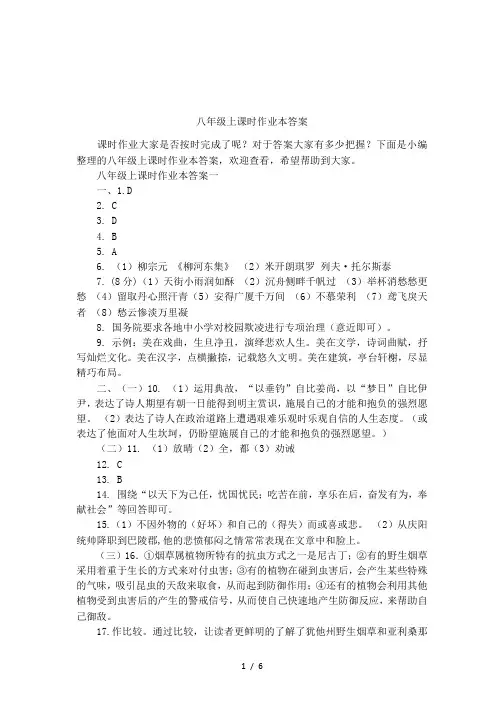
八年级上课时作业本答案 课时作业大家是否按时完成了呢?对于答案大家有多少把握?下面是小编 整理的八年级上课时作业本答案,欢迎查看,希望帮助到大家。
八年级上课时作业本答案一 一、1.D 2. C 3. D 4. B 5. A 6. (1)柳宗元 《柳河东集》 (2)米开朗琪罗 列夫·托尔斯泰 7. (8 分)(1)天街小雨润如酥 (2)沉舟侧畔千帆过 (3)举杯消愁愁更 愁 (4)留取丹心照汗青(5)安得广厦千万间 (6)不慕荣利 (7)鸢飞戾天 者 (8)愁云惨淡万里凝 8. 国务院要求各地中小学对校园欺凌进行专项治理(意近即可)。
9. 示例:美在戏曲,生旦净丑,演绎悲欢人生。
美在文学,诗词曲赋,抒 写灿烂文化。
美在汉字,点横撇捺,记载悠久文明。
美在建筑,亭台轩榭,尽显 精巧布局。
二、(一)10. (1)运用典故,“以垂钓”自比姜尚,以“梦日”自比伊 尹, 表达了诗人期望有朝一日能得到明主赏识, 施展自己的才能和抱负的强烈愿 望。
(2)表达了诗人在政治道路上遭遇艰难乐观时乐观自信的人生态度。
(或 表达了他面对人生坎坷,仍盼望施展自己的才能和抱负的强烈愿望。
) (二)11. (1)放晴(2)全,都(3)劝诫 12. C 13. B 14. 围绕“以天下为己任,忧国忧民;吃苦在前,享乐在后,奋发有为,奉 献社会”等回答即可。
15.(1)不因外物的(好坏)和自己的(得失)而或喜或悲。
(2)从庆阳 统帅降职到巴陵郡,他的悲愤郁闷之情常常表现在文章中和脸上。
(三)16.①烟草属植物所特有的抗虫方式之一是尼古丁;②有的野生烟草 采用着重于生长的方式来对付虫害; ③有的植物在碰到虫害后, 会产生某些特殊 的气味,吸引昆虫的天敌来取食,从而起到防御作用;④还有的植物会利用其他 植物受到虫害后的产生的警戒信号, 从而使自己快速地产生防御反应, 来帮助自 己御敌。
17.作比较。
通过比较,让读者更鲜明的了解了犹他州野生烟草和亚利桑那1/6州野生烟草因抗性不同, 所以采用的防御虫害的方式也不同, 给读者留下深刻的 印象,增强说明的效果。
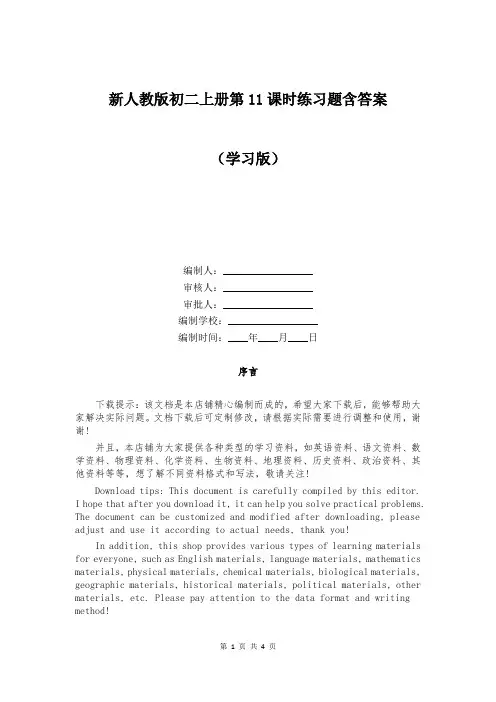
新人教版初二上册第11课时练习题含答案(学习版)编制人:__________________审核人:__________________审批人:__________________编制学校:__________________编制时间:____年____月____日序言下载提示:该文档是本店铺精心编制而成的,希望大家下载后,能够帮助大家解决实际问题。
文档下载后可定制修改,请根据实际需要进行调整和使用,谢谢!并且,本店铺为大家提供各种类型的学习资料,如英语资料、语文资料、数学资料、物理资料、化学资料、生物资料、地理资料、历史资料、政治资料、其他资料等等,想了解不同资料格式和写法,敬请关注!Download tips: This document is carefully compiled by this editor.I hope that after you download it, it can help you solve practical problems. The document can be customized and modified after downloading, please adjust and use it according to actual needs, thank you!In addition, this shop provides various types of learning materials for everyone, such as English materials, language materials, mathematics materials, physical materials, chemical materials, biological materials, geographic materials, historical materials, political materials, other materials, etc. Please pay attention to the data format and writing method!新人教版初二上册第11课时练习题含答案八上历史第11课北伐战争复习测试题(带答案新人教版)一、选择题1.为了弘扬长征精神,某校学生编排课本剧《红军不怕远征难》。
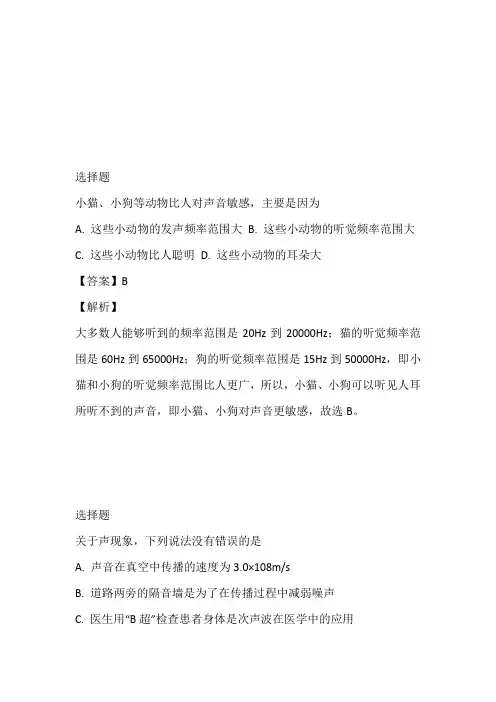
选择题小猫、小狗等动物比人对声音敏感,主要是因为A. 这些小动物的发声频率范围大B. 这些小动物的听觉频率范围大C. 这些小动物比人聪明D. 这些小动物的耳朵大【答案】B【解析】大多数人能够听到的频率范围是20Hz到20000Hz;猫的听觉频率范围是60Hz到65000Hz;狗的听觉频率范围是15Hz到50000Hz,即小猫和小狗的听觉频率范围比人更广,所以,小猫、小狗可以听见人耳所听不到的声音,即小猫、小狗对声音更敏感,故选B。
选择题关于声现象,下列说法没有错误的是A. 声音在真空中传播的速度为3.0×108m/sB. 道路两旁的隔音墙是为了在传播过程中减弱噪声C. 医生用“B超”检查患者身体是次声波在医学中的应用D. “不敢高声语,恐惊天上人”这里的“高”指的是音调高【答案】B【解析】声音传播需要介质,在空气中传播速度为340m/s,在真空中不能传播,故A错误;道路两旁的隔音墙可以阻断噪声的传播途径,起到减小噪声传播的作用,故B正确;医院的B超是利用超声波探查人体内部信息的,故C错误;“不敢高声语,恐惊天上人”中的“高”是指声音的响度大,响度即声音的强弱,故D错误,故选B。
选择题下列事例中,不是利用声传递信息的是A. 远处隆隆的雷声预示着可能有一场大雨B. 铁路工人用铁锤敲打钢轨,确定螺栓是否松动C. 医生利用B超观察人的身体状况D. 在打雷的时候总是先看到闪电,后听到雷声【答案】D【解析】声音的应用有两个方面,即利用声音来传递信息,利用声音来传递能量;隆隆的雷声预示着一场大雨的到来;铁路工人用铁锤敲打钢轨,确定螺栓是否松动;医生利用B超观察人的身体状况,都是利用声音来传递信息;在打雷的时候总是先看到闪电,后听到雷声,说明光速大于声速,而不是声音的应用,故D符合题意,故选D。
选择题关于声现象,下列说法中正确的是A. 用声波能粉碎人体内的“小石头”,说明声波能够传递信息。
B. 敲锣时用力越大,声音的音调越高C. “闻其声而知其人”主要是根据声音的音色来判断的D. 市区内某些路段“禁鸣喇叭”,这是在声音传播的过程中减弱噪声【答案】C【解析】解答:A. 用声波能粉碎人体内的“小石头”,说明声波具有能量,故A错误;B. 敲锣时用力越大,鼓面振动的幅度越大,响度越大,故B错误;C. “闻其声而知其人”说明发声体不同音色不同,因此是根据声音的音色来判断的;故C正确;D. 市区内某些路段“禁鸣喇叭”,这是在声源处减弱噪声,故D错误。
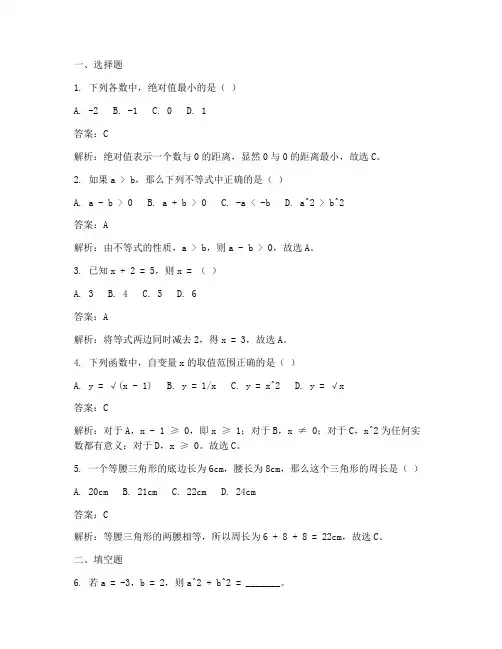
一、选择题1. 下列各数中,绝对值最小的是()A. -2B. -1C. 0D. 1答案:C解析:绝对值表示一个数与0的距离,显然0与0的距离最小,故选C。
2. 如果a > b,那么下列不等式中正确的是()A. a - b > 0B. a + b > 0C. -a < -bD. a^2 > b^2答案:A解析:由不等式的性质,a > b,则a - b > 0,故选A。
3. 已知x + 2 = 5,则x = ()A. 3B. 4C. 5D. 6答案:A解析:将等式两边同时减去2,得x = 3,故选A。
4. 下列函数中,自变量x的取值范围正确的是()A. y = √(x - 1)B. y = 1/xC. y = x^2D. y = √x答案:C解析:对于A,x - 1 ≥ 0,即x ≥ 1;对于B,x ≠ 0;对于C,x^2为任何实数都有意义;对于D,x ≥ 0。
故选C。
5. 一个等腰三角形的底边长为6cm,腰长为8cm,那么这个三角形的周长是()A. 20cmB. 21cmC. 22cmD. 24cm答案:C解析:等腰三角形的两腰相等,所以周长为6 + 8 + 8 = 22cm,故选C。
二、填空题6. 若a = -3,b = 2,则a^2 + b^2 = _______。
答案:13解析:a^2 + b^2 = (-3)^2 + 2^2 = 9 + 4 = 13。
7. 在直角坐标系中,点P(-2, 3)关于x轴的对称点坐标是 _______。
答案:(-2,-3)解析:关于x轴对称,横坐标不变,纵坐标取相反数,故点P的对称点坐标为(-2,-3)。
8. 下列图形中,是轴对称图形的是 _______。
答案:圆解析:轴对称图形是指存在一条直线,使得图形关于这条直线对称。
圆关于任意直径都对称,故圆是轴对称图形。
三、解答题9. 解下列方程:(1)2x - 5 = 3x + 1;(2)3(x - 2) = 2(2x + 1)。
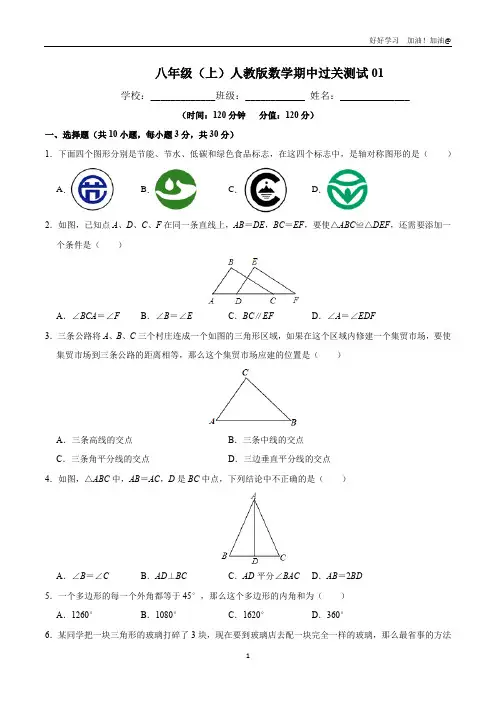
八年级(上)人教版数学期中过关测试01学校:_____________班级:____________ 姓名:______________(时间:120分钟分值:120分)一、选择题(共10小题,每小题3分,共30分)1.下面四个图形分别是节能、节水、低碳和绿色食品标志,在这四个标志中,是轴对称图形的是()A.B.C.D.2.如图,已知点A、D、C、F在同一条直线上,AB=DE,BC=EF,要使△ABC≌△DEF,还需要添加一个条件是()A.∠BCA=∠F B.∠B=∠E C.BC∥EF D.∠A=∠EDF3.三条公路将A、B、C三个村庄连成一个如图的三角形区域,如果在这个区域内修建一个集贸市场,要使集贸市场到三条公路的距离相等,那么这个集贸市场应建的位置是()A.三条高线的交点B.三条中线的交点C.三条角平分线的交点D.三边垂直平分线的交点4.如图,△ABC中,AB=AC,D是BC中点,下列结论中不正确的是()A.∠B=∠C B.AD⊥BC C.AD平分∠BAC D.AB=2BD5.一个多边形的每一个外角都等于45°,那么这个多边形的内角和为()A.1260°B.1080°C.1620°D.360°6.某同学把一块三角形的玻璃打碎了3块,现在要到玻璃店去配一块完全一样的玻璃,那么最省事的方法是()A.带①去B.带②去C.带③去D.带①②③去7.空调安装在墙上时,一般都会采用如图的方法固定,这种方法应用的几何原理是()A.两点确定一条直线B.两点之间线段最短C.三角形的稳定性D.垂线段最短8.以下是四位同学在钝角三角形ABC中画BC边上的高,其中画法正确的是()A.B.C.D.9.如图,在△ABC中,AB、AC的垂直平分线分别交BC于点E、F,若∠BAC=102°,则∠EAF为()A.38°B.40°C.24°D.44°10.如图,在△ABC中,已知点D,E,F分别为BC,AD,EC的中点,且S△ABC=12cm2,则阴影部分面积S=()cm2.A.1B.2C.3D.4二、填空题(共5小题,每小题3分,共15分)11.已知等腰三角形一腰上的高与另一腰的夹角为50°,则等腰三角形的顶角度数为.12.一个三角形的三边为2、4、x,另一个三角形的三边为y、2、6,若这两个三角形全等,则x+y=.13.若一个三角形的三条高所在直线的交点在三角形外部,此三角形是三角形.14.如图所示,∠A=∠E,AC⊥BE,AB=EF,BE=18,CF=8,则AC=.15.如图,△ABC中,∠A=75°,∠B=65°,将纸片的一角折叠,使点C落在△ABC内,若∠1=20°,则∠2的度数是.三、解答题(共8小题,共75分)16.(8分)如果一个多边形的内角和是外角和的3倍还多180°,那么这个多边形的边数是多少?17.(8分)如图,在平面直角坐标系中,A(2,4),B(3,1),C(﹣2,﹣1).(1)在图中作出△ABC关于x轴的对称图形△A1B1C1,并写出点A1,B1,C1的坐标;(2)求△ABC的面积.18.(9分)已知:如图,∠A=∠D=90°,AC=BD.求证:AB=CD.19.(9分)如图,在△ABC中,∠B=26°,∠BAC=30°,过点A作BC边上的高,交BC的延长线于点D,CE平分∠ACD,交AD于点E.求∠AEC的度数.20.(10分)已知:如图,∠A=∠D=90°,点E、F在线段BC上,DE与AF交于点O,且AB=CD,BE =CF.求证:△OEF是等腰三角形.21.(10分)如图,点P是∠AOB外的一点,点Q与P关于OA对称,点R与P关于OB对称,直线QR 分别交OA、OB于点M、N,若PM=PN=4,MN=5.(1)求线段QM、QN的长;(2)求线段QR的长.22.(10分)如图所示,已知△ABD≌△CFD,AD⊥BC于D.(1)求证:CE⊥AB;(2)已知BC=7,AD=5,求AF的长.23.(11分)如图,在四边形ABCD中,AD∥BC,点E为对角线BD上一点,∠A=∠BEC,且AD=BE.(1)求证:△ABD≌△ECB.(2)若∠BDC=70°.求∠ADB的度数.参考答案二、填空题11.40°或140°12.1013.钝角14.1015.60°三、解答题16.解:设这个多边形的边数为n,根据题意,得(n﹣2)•180=360×3+180,解得:n=9.即这个多边形的边数是9.17.解:(1)如图所示:△A1B1C1即为所求,A1(2,﹣4),B1(3,﹣1),C1(﹣2,1).(2)S△ABC=5×5−12×4×5−12×1×3−12×2×5=172.18.证明:连接BC,好好学习 加油!加油@∵∠A =∠D =90°,∴△ABC 和△DCB 都是直角三角形. 在Rt △ABC 和Rt △DCB 中,{BC =CBAC =DB ,∴Rt △ABC ≌Rt △DCB (HL ). ∴AB =CD .19.解:∵∠B =26°,∠BAC =30°, ∴∠ACD =56°, ∵CE 平分∠ACD , ∴∠ACE =∠ECD =28°, ∵AD ⊥BD , ∴∠CDE =90°,∴∠AEC =∠ECD +∠D =118°. 20.证明:∵BE =CF ,∴BE +EF =CF +EF ,即BF =CE , 在Rt △ABF 和Rt △DCE 中,{AB =DC BF =CE ,∴Rt △ABF ≌Rt △DCE (HL ) ∴∠AFB =∠DEC , ∴OE =OF ,∴△OEF 是等腰三角形. 21.解:(1)∵P ,Q 关于OA 对称, ∴OA 垂直平分线段PQ , ∴MQ =MP =4, ∵MN =5,∴QN =MN ﹣MQ =5﹣4=1.(2)∵P ,R 关于OB 对称, ∴OB 垂直平分线段PR , ∴NR =NP =4,∴QR =QN +NR =1+4=5.好好学习 加油!加油@22.(1)证明:∵△ABD ≌△CFD , ∴∠BAD =∠DCF , 又∵∠AFE =∠CFD , ∴∠AEF =∠CDF =90°, ∴CE ⊥AB ;(2)解:∵△ABD ≌△CFD , ∴BD =DF ,∵BC =7,AD =DC =5, ∴BD =BC ﹣CD =2, ∴AF =AD ﹣DF =5﹣2=3.23.证明:(1)∵AD ∥BC , ∴∠ADB =∠CBE ,在△ABD 和△ECB 中,{∠A =∠BECAD =BE ∠ADB =∠CBE ,∴△ABD ≌△ECB (ASA ); (2)∵△ABD ≌△ECB , ∴BD =BC ,∴∠BDC =∠BCD =70°, ∴∠DBC =40°, ∴∠ADB =∠CBD =40°.。
选择题如图所示的军事观察孔,人可以通过孔观察外面,现在在孔中嵌入玻璃砖后观察的范围将( )A.变大B.变小C.不变D.无法确定【答案】A【解析】根据光的直线传播和光的折射定律进行分析,即作出光在空气中的传播路径和光在玻璃砖中的传播路径,然后比较两次观察的范围.解答:解:眼睛通过空气孔看到的范围和通过玻璃看到的范围如图所示:黑色光线表示在空气中的光路,红色表示在嵌入玻璃砖后的光路.从图中可以看出,嵌入玻璃砖后观察的范围变大.故选A.选择题下列有关光现象的描述正确的是A. 日食、月食的形成是由于光折射B. 太阳光是由多种色光组成的C. “水中月”比天空的月亮离我们更近D. 斜插在水中的筷子变弯折是光的反射【答案】B【解析】解答此题从以下知识点入手:A、光沿直线传播,当遇到不透明的物体时,便在物体后形成影。
B、太阳光是复色光,经过三棱镜之后能分解成红橙黄绿蓝靛紫。
C、平面镜成像特点之一,物距等于像距。
D、筷子反射的光在水面发生光的折射,折射角大于入射角,看起来水中的筷子向上弯折了,根据折射定律就可解答此题。
A、光沿直线传播,当遇到不透明的物体时,便在物体后形成影,日食和月食就是光的直线传播产生的自然现象;故本选项错误;B、太阳光能分解成红橙黄绿蓝靛紫七种颜色的光,所以太阳光由红橙黄绿蓝靛紫七种颜色的光组成,故本选项正确;C、“水中月”是平面镜成像,平面镜成像中物距等于像距,故本选项错误;D、插入水中的筷子,由于筷子反射的光在水面处发生光的折射,根据折射定律,折射角大于入射角,所以我们看到筷子变弯折,故本选项错误。
故选:B。
选择题下列光现象中,属于光沿直线传播的是A. 放大镜B. 手影C. 水中“折”笔D. 水中倒影【答案】B【解析】①光在同种均匀物质中沿直线传播,在日常生活中,激光准直、小孔成像和影子的形成等都表明光在同一种均匀介质中是沿直线传播的;②当光照射到物体界面上时,有一部分光被反射回来,例如:平面镜成像、水中倒影等;③当光从一种介质斜射入另一种介质时,传播方向的会偏折,发生折射现象,如:看水里的鱼比实际位置浅等。
人教版2022年八年级生物上册课时练习带答案与解析选择题下列不是软体动物的是()A. 河蚌B. 蚯蚓C. 蜗牛D. 乌贼【答案】B【解析】河蚌、蜗牛、乌贼的身体柔软,蜗牛、河蚌均由有贝壳保护,乌贼的贝壳退化,有腕足,它们都属于软体动物;而蚯蚓身体分节,属于环节动物。
选择题以下属于河蚌、扇贝、蜗牛共同特征的是A. 具有肺B. 利用体壁呼吸C. 体内有脊柱D. 具有外套膜【答案】D【解析】软体动物的特征:身体柔软,用鳃呼吸,具有坚硬的贝壳,身体藏在壳中,藉以获得保护,由于贝壳会妨碍活动,所以它们的行动都相当缓慢;不分节,可分为头、足、内脏团三部分,体外外套膜,常常分泌有贝壳,有的贝壳退化。
河蚌、蜗牛、扇贝都属于软体动物,具有的共同特征是身体柔软、有外套膜。
选择题海螵蛸是一种具有止血功能的药材,它属于下列哪一种动物的贝壳?()A. 蜗牛B. 乌贼C. 牡蛎D. 扇贝【答案】B【解析】软体动物的基本结构特点:身体柔软,具有坚硬的贝壳,身体藏在壳中,藉以获得保护,由于贝壳会妨碍活动,所以它们的行动都相当缓慢,有的贝壳退化;不分节,可区分为头、足、内脏团三部分,体外有外套膜。
乌贼属于软体动物,其贝壳退化成内壳。
海螵蛸为乌贼科动物无针乌贼或金乌贼的内壳。
产于中国沿海如辽宁、江苏、浙江等地。
原动物肉食性,栖息于海底。
乌贼退化的内壳可以入药,临床用名有海螵蛸、乌贼骨。
选择题下列动物中,不属于节肢动物的是()A. B. C. D.【答案】B【解析】节肢动物的身体许多体节构成的,并且分部,体表有外骨骼,足和触角也分节,节肢动物包括昆虫纲、多足纲、蛛形纲、甲壳纲。
螃蟹、蜘蛛、蜈蚣,都属于节肢动物;章鱼身体柔软,有外套膜,因此属于软体动物。
选择题下列动物中体表有外骨骼的是A. 水母B. 蜜蜂C. 蚯蚓D. 蜗牛【答案】B【解析】节肢动物具有身体由许多体节构成、体表有外骨骼、足和触角分节等特征,蜜蜂属于节肢动物,体表有外骨骼。
选择题关于声音,下列说法正确的是A. 声音在不同介质中传播速度相同B. 用“B超”诊断疾病是利用超声波传递能量C. 声音是由物体的振动产生的D. 宇航员在月球也可以直接交谈【答案】C【解析】解决此类问题要知道声音是由物体的振动产生的,声音的传播需要介质,在不同的介质中的传播速度不同,真空不能传声,声音可以传递信息和能量。
A、声音的传播需要介质,但在不同的介质中的传播速度不同,故A 错误;B、用“B超”诊断疾病是利用超声波传递信息,故B错误;C、声音是由物体的振动产生的,故C正确;D、月球上没有空气,是真空,真空不能传声,宇航员在月球不可以直接交谈,故D错误。
故选:C。
选择题我们生活在一个充满声音的世界里,下列关于声音的说法中正确的是A. 我们可以利用回声来测量地球和月球之间的距离。
B. 用听诊器检查身体是利用了超声波。
C. “声纹门锁”是依据声音的响度来识别的。
D. 在遂宁市区铁路高架桥两侧修隔音墙是在传播过程中减弱噪声。
【答案】D【解析】由于声音不能在真空中传播,所以不能用声来测量地球和月球之间的距离,故A错;超声波人耳是听不到的,用听诊器检查身体不是利用超声波,故B错;不同声音的音色是不同的,“声纹门锁”是依据声音的音色来识别的,故C错;铁路高架桥两侧修隔音墙是在传播过程中减弱噪声,故D正确;应选D。
选择题下列与声现象有关的说法中正确的是A. 只要物体振动人们就能听到声音B. 利用超声波可以测出地球离月球的距离C. 我们听不到蝴蝶翅膀振动发出的声音是因为响度太小D. B超是利用了声音可以传递信息【答案】D【解析】①物体振动发出声音,但并不是所有的声音人耳都能的到,只有响度和频率合适,人耳才能的到声音;②超声波不能在真空中传播,而月球与地球之间是有一段真空的;③次声波是振动频率小于20赫兹的声波,人耳的听觉范围是20赫兹到20000赫兹;④声音可以传递信息和能量。
A、人耳听觉有一定的范围,即频率20-20000Hz之间,且有一定的响度,因此,并非只要物体振动人们就能听到声音,说法错误;B、超声波无法在真空中传播,因此不能利用超声波测出地球离月球的距离,说法错误;C、因为蝴蝶翅膀振动发出的声音频率小于20赫兹,是次声波,人耳听不到,故C错误;D、B超是利用了声音可以传递信息,说法正确。
初二英语课课练答案八上英语课课练答案人教版初二英语课堂练习答案初二英语课堂练习答案一.1-5.CBCCA 6-10.BACAB 11-15.ABBCC 16-20.BACCA二.1-5.BBADC 6-10.DCADC 11-15.CBACC 16-20.DDDCC三.1-5.BCDAA 6-10.ADBDC 11-15.CABDC四.1-5.DCDAB 6-10.ACBBD 11-15.CDBDB 16-20.DADCB五.1.There used to be a river in front of myhouse.2.home3.但是现在随着村子的发展,一切都发生了很大的变化。
4.Because the trees have been cut down.5.But now,with the development of my village,everything has changed a lot.六.1.southern 2.impossible3.action(s)4.taking5.harmful6.have taught7.factories8.attraction9.marriage 10.clapped11.development 12.Unluckily 13.natural14.unpleasant 15.was having七.took e____cited more view wonderful theme gift also enjoyed visit八.作文(略)初二英语答案(1)天河区初二英语期末考试参考答案0906一、听力测试第一节:对话理解1.C2.C3.B4.C5.B6.C7.A8.B9.A 10.A11.A 12.C 13.C 14.A 15.C第二节:听取信息(A)16/ si____teen (B)four or five/ 4-5 (C)holidays(D)fast food (E)life二、语言知识与运用第一节:单项选择16.D 17.C 18.A 19.B 20.D 21.D 22.A 25.A第二节:语法填空26.B 27.C 28.A 29.D 30.A 31.B 32.D 34.B 35.C三、阅读与理解(共40分)第一节:完形填空36.A 37.B 38.B 39.B 41.C 42.D 43.C 44.D 45.D第二节:阅读与理解46.C 47.B 48.D 49.C 51.C 52.D 53.A 54.B 55.D56.C 57.B 58.A 59.C四、写作部分(共35第一节完成句子61.allowed impression 64. order 65. chatting第二节 67. tired, took/ had 68. used, getting70. after all72. told, not 73. how, to75. in, place第四节书面表达Films are everywhere.Many teenagers like to go to the cinema.So do some students.Crystal Unlike Crystal, Tina likes detective films best.She also like watching foreign films,附:书面表达评分标准内容说明(共5分)语言表达不一定完全相同,表达出正确的意思即可。
选择题根据图中所示信息,判断下列说法正确的是A. 蝙蝠可以发出频率为400Hz的声音B. 人能听到蝙蝠发出的所有频率的声音C. 人听觉频率范围比人发声频率范围要大D. 15Hz的声音只要振幅足够大,人耳是能听到的【答案】C【解析】试题根据图片,可得:人和蝙蝠的发声频率范围都比听觉范围要小,但都只能听到一部分频率的声音.人和蝙蝠的听觉范围不完全相同:人耳只能听到20-20000Hz的声音,蝙蝠只能听到1000-120000Hz的声音,故选C。
选择题“B超”是利用超声波来诊断病情的,但是人们听不到它发出的声音,这是因为A. 声音的频率高于人的听觉频率B. 声音的频率低于人的听觉频率C. 声音的频率高于人的发声的频率D. 声音的频率低于人的发声的频率【答案】A【解析】“B超”是利用超声波来诊断病情的,超声波的频率高于人的听觉频率范围,所以人们听不到它发出的声音。
选项A的说法是正确的。
思路分析:“B超”是利用超声波来诊断病情的,但是人们听不到它发出的声音,这是因为声音的频率高于人的听觉频率。
选择题人发声的频率范围大约为A. 20 HZ~1100 HZB. 85 HZ~20000 HZC. 85 HZ~1100 HZD. 20 HZ~20000 HZ【答案】C【解析】人能听到和人能发出的声音频率都有一定的范围,大多数人能够听到的声音频率范围是20Hz到20000Hz;大多数人能够发出的声音频率范围是85Hz到1100Hz,故选C。
选择题有一种电子牙刷,它发出的超声波,能直达牙刷棕毛刷不到的地方,这样刷牙既干净又舒服。
关于电子牙刷,下列说法中正确的是()A. 人听不到超声波,是因为超声波不能在空气中传播B. 超声波能传递能量C. 超声波不是由物体振动产生的D. 超声波的音调很低,所以人听不到【答案】B【解析】A、超声波能够在空气中传播,该选项说法不正确;B、超声波可以传递能量,电子牙刷就是利用了这个道理,该选项说法正确;C、超声波是由物体振动产生的,该选项说法不正确;D、超声波的频率高于20000Hz,频率太高,即音调太高,其不在人耳的听觉范围之内,所以听不到超声波,该选项说法不正确。
人教版八年级道德与法治上册课时练第一单元走进社会生活第一课丰富的社会生活一、填空题(每空1分,共10分)1.我们有亲人,有同学,未来还会有同事,这说明人们在社会交往中形成了各种________________。
2.下列是小明最喜欢的名句,请你帮他填上各自体现的社会关系。
诗句本是同根生,相煎何太急将军百战死,壮士十年归同是长干人,生小不相识谁言寸草心,报得三春晖社会关系血缘关系3.“中国梦归根到底是人民的梦,必须紧紧依靠人民来实现。
”这反映了________是________的有机组成部分,社会的发展需要每个人的积极参与。
4.右图是唐小军的部分日常生活情境。
人的生存和发展离不开社会,三个情境中能给唐小军提供物质支持的是________;能让他获得精神滋养的是________;属于亲社会行为的是________。
(填写序号)5.小华每年利用寒假去博物馆做义务讲解员,这有利于培养他的________________行为。
二、简答题(共10分)6.融入社会奉献社会欣赏漫画,回答下列问题:(1)除漫画中的行为外,请你再举一例亲社会行为。
(2分)__________________________________________________________________ __________________________________________________________________ (2)这两幅漫画体现的亲社会行为有何意义?(6分)__________________________________________________________________ __________________________________________________________________ (3)作为中学生,我们应怎样培养亲社会行为?(2分)__________________________________________________________________ __________________________________________________________________第二课网络生活新空间一、填空题(每空1分,共10分)1.课前同学们搜集了三张图片。
矿产资源开发利用方案编写内容要求及审查大纲
矿产资源开发利用方案编写内容要求及《矿产资源开发利用方案》审查大纲一、概述
㈠矿区位置、隶属关系和企业性质。
如为改扩建矿山, 应说明矿山现状、
特点及存在的主要问题。
㈡编制依据
(1简述项目前期工作进展情况及与有关方面对项目的意向性协议情况。
(2 列出开发利用方案编制所依据的主要基础性资料的名称。
如经储量管理部门认定的矿区地质勘探报告、选矿试验报告、加工利用试验报告、工程地质初评资料、矿区水文资料和供水资料等。
对改、扩建矿山应有生产实际资料, 如矿山总平面现状图、矿床开拓系统图、采场现状图和主要采选设备清单等。
二、矿产品需求现状和预测
㈠该矿产在国内需求情况和市场供应情况
1、矿产品现状及加工利用趋向。
2、国内近、远期的需求量及主要销向预测。
㈡产品价格分析
1、国内矿产品价格现状。
2、矿产品价格稳定性及变化趋势。
三、矿产资源概况
㈠矿区总体概况
1、矿区总体规划情况。
2、矿区矿产资源概况。
3、该设计与矿区总体开发的关系。
㈡该设计项目的资源概况
1、矿床地质及构造特征。
2、矿床开采技术条件及水文地质条件。